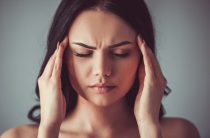5 Physical Signs of Anxiety and How it Affects Your Body

With anxiety being a mental health condition, most people don’t take into account the physical strain it can have on your body or the physical symptoms that can be felt. Anxiety can present itself in a variety of ways. The overwhelming and extreme emotions can wreak havoc on not only the mind but the body as well. Anxiety can present similar symptoms to a physical health condition and can have long-term effects on the body if not recognized and addressed.
Below, we’ve highlighted some of the most common physical symptoms and how to recognize when they’re happening:
Headaches and Migraines
It has been proven that one of the most common physical signs of anxiety is headaches and migraines. Headaches can occur for many reasons however when dealing with anxiety, thoughts can race and spiral into uncontrollable fear and stress causing an aching head and severe migraines.
Insomnia and Tiredness
Anxiety can also be shown through insomnia and chronic tiredness – this mental health condition can be exhausting and can prevent or at the least make it extremely difficult to fall asleep and stay asleep. People who suffer from anxiety are often restless, and the spiked rushes of adrenaline prevents your body from relaxing and recharging. This ultimately leads to serious exhaustion.
Loss or Shortness of Breath
Shortness of breath goes hand-in-hand with increased heart rate, sweating, and high blood pressure. When your body is signalled into fight or flight responses from anxiety, your stress response boosts how quickly your blood is circulating which leads to higher blood pressure and shortness of breath. If this takes over and turns into extreme hyperventilation, this can also be a sign of an anxiety attack occurring.
Overall Edginess
People dealing with anxiety can seem almost irritable or touchy, which may present itself as someone physically shaking or off-balance. This can trigger a loop, with the symptom becoming more severe as the individual can become even more distressed when this occurs.
Chest Pain
Chest pain is often a symptom that occurs after a panic attack, heightened reactions, or extreme distress. This is an alarming symptom and can be linked to heart issues and conditions. Chest pain caused by anxiety can include but is not limited to sharp shooting chest pains, a constant ache, pressure, tightness, and burning. If this symptom occurs, precautions should be taken.
These symptoms should not be taken lightly. The physical side effects of anxiety are often as uncomfortable and overwhelming as those of a physical health condition. If you or a loved one are feeling any of these symptoms, contact us at Ottawa Counselling today to speak with a professional.